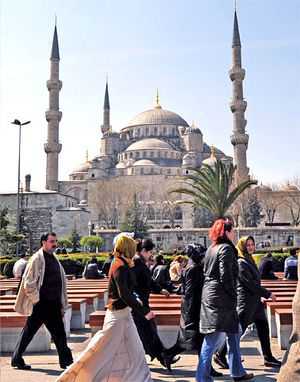In a fierce legal battle, Islamists and secularists are undermining the very system that can help them.
from the July 11, 2008 edition
Think of Turkey and the lively Grand Bazaar of Istanbul comes to mind, or the massive dome of Hagia Sophia. But its political fame is as the world’s longest-lived democracy in a Muslim country – an example that Islam and civil liberties can coexist. Now that democracy faces a severe test.
Turkey’s two most powerful political forces – Islamists, who head the government, and secularists, who run the military, courts, and bureaucracy – are engaged in a fierce battle for dominance in this NATO country. Their arena is the highly politicized legal system.
A judicial duel may not sound very dangerous. But to the degree that this duel harms the very democratic principles that allow both groups to thrive in the first place, the consequences could be grave.
Completely ignoring last year’s elections that returned the mildly Islamist ruling party, the AKP, to power with more popular support than ever, secularists are trying to overthrow the AKP in a constitutional court whose judges sympathize with the secularist cause.
Last week, the state’s chief prosecutor argued that the AKP should be outlawed because it violates the constitution’s strict separation of mosque and state – the legacy of modern Turkey’s founder, Mustafa Kemal Ataturk. The trigger for the case was the AKP’s recent lifting of the ban on women’s Islamic head scarves at universities. It was a small but hugely symbolic attempt at greater religious freedom, but last month, the constitutional court rejected it.
The AKP’s general counter-strategy is to arrest alleged secular supporters of a suspected coup plot. At least 20 people were detained last week, including two retired generals. There is some evidence for the alleged plot, but some of these arrests look indiscriminate, involving journalists, for instance. The tactics mirror an AKP tendency toward intimidation, in which critics are jailed for months without charge.
Not just Turkey’s political and economic stability are at stake here. So are its membership talks with the European Union, its critical relations with neighbor Iraq (itself a fledgeling democracy), and its role-model status for Islam.
The underlying tension comes from fear of extremism – fear on one side that the AKP’s modest steps toward greater religious expression will morph into sharia law; on the other side, fear of secularists suppressing an increasingly devout population.
Both groups are at rough parity in the influence game. They need a trustworthy way to work out an acceptable balance for the role of religion in the Turkish public sphere.
A strong democracy can provide that “safe” way – but not if it’s subverted, as it is being now.
Given the high court’s track record, it’s likely to ban the AKP. A period of uncertainty will follow as the party tries to regroup, probably under a different name.
Even with this murky outlook, the onus is on the governing party to take every possible step to reassure Turks that it indeed supports a secular, rule-based democracy – as it’s said all along.
But if the undermining continues, and if Turkey’s leaders fail not only to respect the democracy they have but to improve it through eventual constitutional and judicial reform, they will simply drag their country down in a war of wills.
Source :
